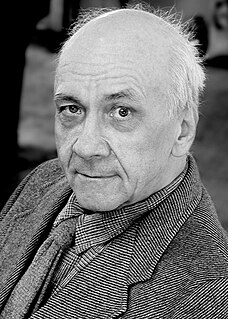Related Research Articles

The Pulitzer Prize for Music is one of seven Pulitzer Prizes awarded annually in Letters, Drama, and Music. It was first given in 1943. Joseph Pulitzer arranged for a music scholarship to be awarded each year, and this was eventually converted into a prize: "For a distinguished musical composition of significant dimension by an American that has had its first performance in the United States during the year."
Harold Samuel Shapero was an American composer.

Serge Alexandrovich Koussevitzky was a Russian-born conductor, composer and double-bassist, known for his long tenure as music director of the Boston Symphony Orchestra from 1924 to 1949.

Walter Hamor Piston, Jr., was an American composer of classical music, music theorist, and professor of music at Harvard University.

Lukas Foss was a German-American composer, pianist, and conductor.
Alvin Derald Etler was an American composer and oboist.
Howard Pollack is a prominent American pianist and musicologist, known for his biographies of American composers.
Lincoln Portrait is a classical orchestral work written by the American composer Aaron Copland. The work involves a full orchestra, with particular emphasis on the brass section at climactic moments. The work is narrated with the reading of excerpts of Abraham Lincoln's great documents, including the Gettysburg Address. An orchestra usually invites a prominent person to be the narrator.
Samuel Hans Adler is an American composer, conductor, author, and professor. During the course of a professional career which ranges over six decades he has served as a faculty member at both the University of Rochester's Eastman School of Music and the Juilliard School. In addition, he is credited with founding and conducting the Seventh Army Symphony Orchestra which participated in the cultural diplomacy initiatives of the United States in Germany and throughout Europe in the aftermath of World War II. Adler's musical catalogue includes over 400 published compositions. He has been honored with several awards including Germany's Order of Merit – Officer's Cross.
Irving Gifford Fine was an American composer. Fine's work assimilated neoclassical, romantic, and serial elements. Composer Virgil Thomson described Fine's "unusual melodic grace" while Aaron Copland noted the "elegance, style, finish and...convincing continuity" of Fine's music.

William Quincy Porter was an American composer and teacher of classical music.
Barbara Kolb is an American composer. Her music uses sound masses and often creates vertical structures through simultaneous rhythmic or melodic units. Kolb's musical style can be identified by her use of colorful textures, impressionistic touch, and atonal vocabulary, with influences stemming from literary and visual arts. She was the first American woman composer to win the Rome Prize.
Yehudi Wyner is an American composer, pianist, conductor and music educator.
Fredell Lack was an American violinist. Noted as a concert soloist, recording artist, chamber musician, and teacher, she was the C. W. Moores Distinguished Professor of Violin at the Moores School of Music at the University of Houston in Houston, Texas.
Capricorn Concerto, Op. 21, is a composition for flute, oboe, trumpet, and strings by Samuel Barber, completed on September 8, 1944. A typical performance lasts approximately 14 minutes.
Allen Sapp was a composer of music for piano, voice, chamber and orchestral music.
The Holiday Overture is a composition for orchestra by Elliott Carter. Carter wrote the work during the summer of 1944, on commission from the Boston Symphony Orchestra, to celebrate the liberation of Paris during World War II. In addition, Carter composed the overture for the Independent Concert Music Publisher's Contest 1945, and won this competition. The overture was to have been premiered in Boston. However, Carter made a copy of some parts of the work. Eventually, the work received its premiere in Frankfurt in 1946, conducted by Hans Blümer. In 1961, Carter revised the overture.

Harold Boatrite was an American composer.
Robert Moffat (variously "Moffatt" and "Moffett") Palmer was an American composer, pianist and educator. He composed more than 90 works, including two symphonies, Nabuchodonosor, a piano concerto, four string quartets, three piano sonatas and numerous works for chamber ensembles.
Norman Myron Dinerstein was an American composer and pedagogue.
References
- ↑ Clifton, Keith E. (2008). Recent American Art Song: A Guide, p.87. Scarecrow. ISBN 1461670780. "HORVIT, MICHAEL (b. 1932) Michael Horvit currently teaches music theory and composition at the University of Houston. Trained at Yale University (BM, MM) and Boston University (DMA), Horvit has studied with Aaron Copland, Lukas Foss, and Walter Piston. His works range from solo instrumental and vocal pieces to operas and symphonic music, much of it inspired by his Jewish faith."
- ↑ "Moores School of Music faculty: Michael Horvit". Archived from the original on 17 January 2008. Retrieved 2 April 2020.
{{cite web}}: CS1 maint: bot: original URL status unknown (link) - ↑ Michael Horvit. Milken Archive of Jewish Music. Retrieved 2017-03-12.